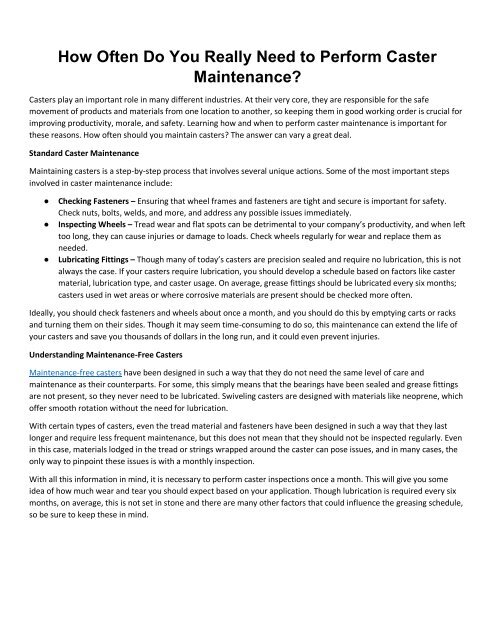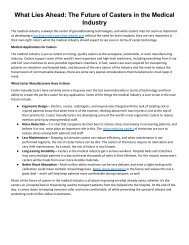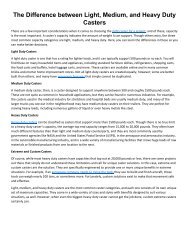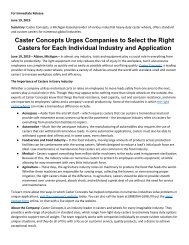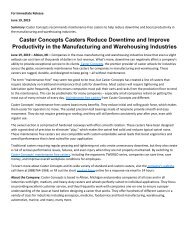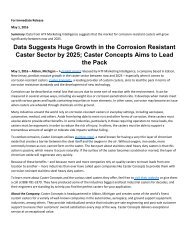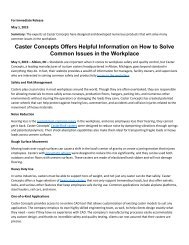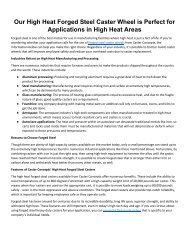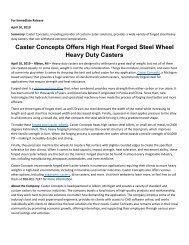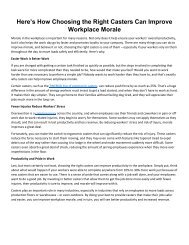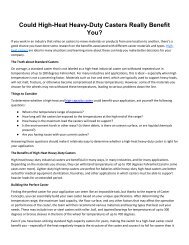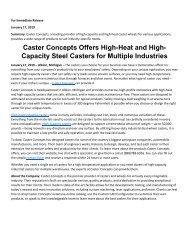How Often Do You Really Need to Perform Caster Maintenance?
Casters play an important role in many different industries. At their very core, they are responsible for the safe movement of products and materials from one location to another, so keeping them in good working order is crucial for improving productivity, morale, and safety. Visit: http://www.casterconcepts.com
Casters play an important role in many different industries. At their very core, they are responsible for the safe movement of products and materials from one location to another, so keeping them in good working order is crucial for improving productivity, morale, and safety. Visit: http://www.casterconcepts.com
Create successful ePaper yourself
Turn your PDF publications into a flip-book with our unique Google optimized e-Paper software.
<strong>How</strong> <strong>Often</strong> <strong>Do</strong> <strong>You</strong> <strong>Really</strong> <strong>Need</strong> <strong>to</strong> <strong>Perform</strong> <strong>Caster</strong><br />
<strong>Maintenance</strong>?<br />
<strong>Caster</strong>s play an important role in many different industries. At their very core, they are responsible for the safe<br />
movement of products and materials from one location <strong>to</strong> another, so keeping them in good working order is crucial for<br />
improving productivity, morale, and safety. Learning how and when <strong>to</strong> perform caster maintenance is important for<br />
these reasons. <strong>How</strong> often should you maintain casters? The answer can vary a great deal.<br />
Standard <strong>Caster</strong> <strong>Maintenance</strong><br />
Maintaining casters is a step-by-step process that involves several unique actions. Some of the most important steps<br />
involved in caster maintenance include:<br />
● Checking Fasteners – Ensuring that wheel frames and fasteners are tight and secure is important for safety.<br />
Check nuts, bolts, welds, and more, and address any possible issues immediately.<br />
● Inspecting Wheels – Tread wear and flat spots can be detrimental <strong>to</strong> your company’s productivity, and when left<br />
<strong>to</strong>o long, they can cause injuries or damage <strong>to</strong> loads. Check wheels regularly for wear and replace them as<br />
needed.<br />
● Lubricating Fittings – Though many of <strong>to</strong>day’s casters are precision sealed and require no lubrication, this is not<br />
always the case. If your casters require lubrication, you should develop a schedule based on fac<strong>to</strong>rs like caster<br />
material, lubrication type, and caster usage. On average, grease fittings should be lubricated every six months;<br />
casters used in wet areas or where corrosive materials are present should be checked more often.<br />
Ideally, you should check fasteners and wheels about once a month, and you should do this by emptying carts or racks<br />
and turning them on their sides. Though it may seem time-consuming <strong>to</strong> do so, this maintenance can extend the life of<br />
your casters and save you thousands of dollars in the long run, and it could even prevent injuries.<br />
Understanding <strong>Maintenance</strong>-Free <strong>Caster</strong>s<br />
<strong>Maintenance</strong>-free casters have been designed in such a way that they do not need the same level of care and<br />
maintenance as their counterparts. For some, this simply means that the bearings have been sealed and grease fittings<br />
are not present, so they never need <strong>to</strong> be lubricated. Swiveling casters are designed with materials like neoprene, which<br />
offer smooth rotation without the need for lubrication.<br />
With certain types of casters, even the tread material and fasteners have been designed in such a way that they last<br />
longer and require less frequent maintenance, but this does not mean that they should not be inspected regularly. Even<br />
in this case, materials lodged in the tread or strings wrapped around the caster can pose issues, and in many cases, the<br />
only way <strong>to</strong> pinpoint these issues is with a monthly inspection.<br />
With all this information in mind, it is necessary <strong>to</strong> perform caster inspections once a month. This will give you some<br />
idea of how much wear and tear you should expect based on your application. Though lubrication is required every six<br />
months, on average, this is not set in s<strong>to</strong>ne and there are many other fac<strong>to</strong>rs that could influence the greasing schedule,<br />
so be sure <strong>to</strong> keep these in mind.


